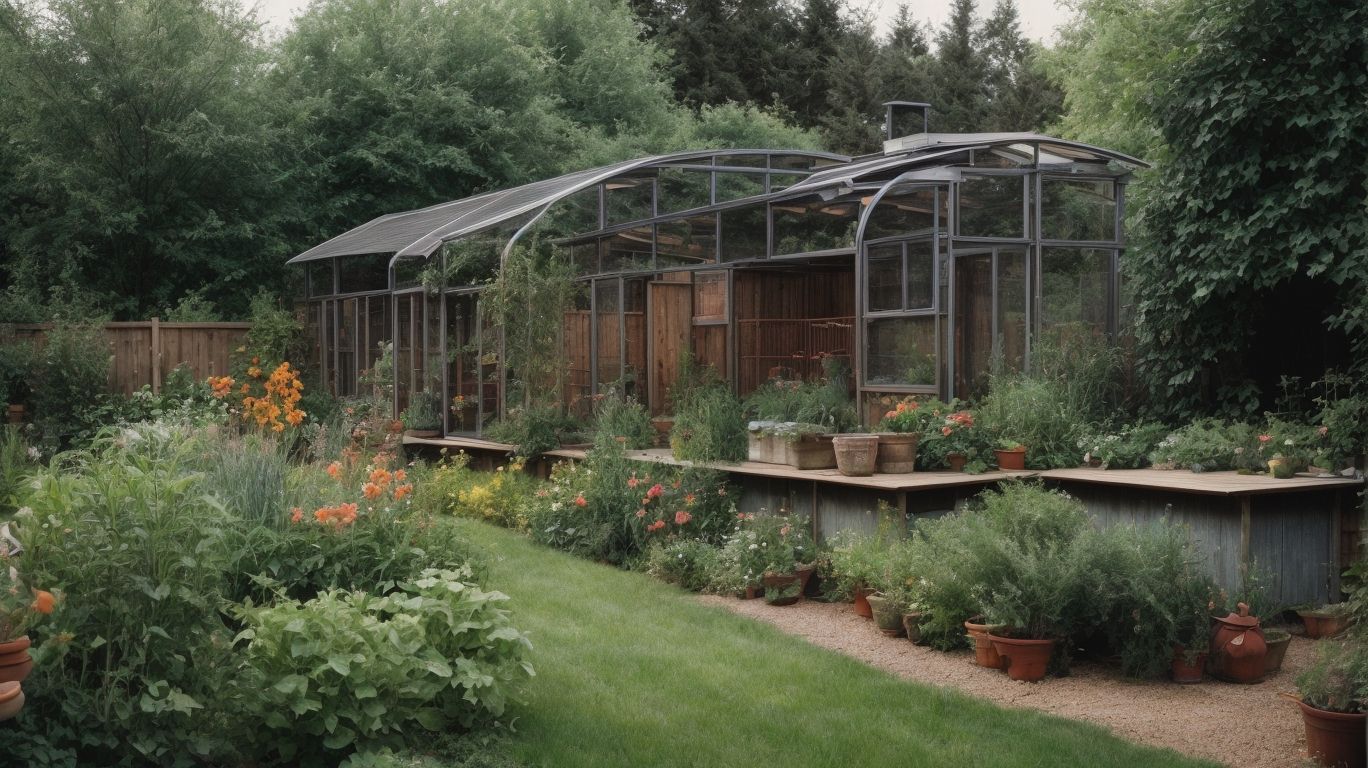Activated charcoal, a versatile and widely-used substance, has gained popularity in gardening for its numerous benefits. From improving soil quality to controlling pests, activated charcoal has become a go-to solution for gardening enthusiasts. In this comprehensive guide, we will delve into the world of activated charcoal, exploring its composition, working mechanism, benefits, types, and factors to consider when selecting the right one for your gardening needs. We will discuss the various methods of using activated charcoal in gardening and essential precautions to ensure its safe and effective application. Whether you’re a seasoned gardener or just starting out, understanding how to choose the right activated charcoal will elevate your gardening practices and yield impressive results.
Key Takeaways:
What Is Activated Charcoal?
Activated charcoal, also known as activated carbon, is a form of charcoal that has been processed to make it extremely porous, allowing it to effectively adsorb a wide range of substances from the surrounding environment.
Its high surface area and porous structure are the result of the activation process, which involves treating the charcoal with oxygen, steam, or various chemicals. This activation process creates a network of tiny pores that can trap and remove impurities and contaminants through the mechanism of adsorption.
Activated charcoal finds diverse applications across industries, ranging from water and air purification to medical treatments and agricultural uses. In gardening and agriculture, horticultural charcoal, a type of activated charcoal specially tailored for soil improvement, is utilized to enhance soil structure, optimize water retention, and promote better plant growth.
What Is Activated Charcoal Made Of?
Activated charcoal is predominantly made from natural sources such as coconut shells or wood waste, which undergo a process of activation to create its highly porous structure.
The activation process begins with the raw materials being heated to high temperatures, creating a carbonized product. This is then treated with an activating agent, such as steam or carbon dioxide, at high temperatures. The result of this process is the formation of a vast network of pores and a significantly increased surface area, making activated charcoal an excellent adsorbent. These properties make it a popular choice in various industries, including horticulture for soil conditioning and water filtration.
How Does Activated Charcoal Work in Gardening?
Activated charcoal plays a crucial role in gardening by enhancing soil quality, promoting plant growth, and addressing issues related to water drainage, air circulation, and the absorption of organic materials.
One of the primary functions of activated charcoal in gardening is its ability to improve soil structure. It helps in making the soil more porous, which enhances water retention and drainage, crucial for ensuring the optimal growth of plants. Activated charcoal acts as a neutralizing agent, reducing the acidity in the soil, thereby creating a favorable environment for plant roots to thrive. Its porous nature allows for better air circulation, promoting healthier root systems and overall plant health.
Another significant application of activated charcoal in horticulture is its use as biochar. This renewable resource can be incorporated into the soil to improve its fertility and moisture retention, making it an environmentally friendly option for enhancing soil quality. It aids in the absorption of harmful substances, such as excess nutrients or toxins, thereby safeguarding plant health and contributing to sustainable gardening practices.
What Are the Benefits of Using Activated Charcoal in Gardening?
The use of activated charcoal in gardening offers numerous benefits, including improved soil structure, enhanced absorption qualities, air purification, water treatment capabilities, and the promotion of soil health in agricultural settings.
Activated charcoal serves as a valuable tool for improving soil fertility and structure due to its porous nature, which promotes aeration and drainage while retaining essential nutrients. Its ability to absorb impurities and toxins from the surrounding environment enhances air and water quality, providing a healthier ecosystem for plants to thrive. In the horticultural industry, activated charcoal is utilized in biochar production, contributing to sustainable plant growth and environmental conservation. Its incorporation into agricultural soil health practices helps rejuvenate and revitalize the land, supporting long-term sustainability and productivity.
What Are the Different Types of Activated Charcoal for Gardening?
In gardening, various types of activated charcoal are available, each tailored to specific applications and endorsed by entities such as SuperMoss, the National Gardening Bureau, and experts like John Dinsley and Kimberly.
Activated charcoal in gardening serves multiple purposes, from enhancing soil quality to mitigating odors and absorbing impurities. SuperMoss, a prominent name in the gardening industry, has recommended activated charcoal for its effectiveness in maintaining soil moisture and improving aeration.
The National Gardening Bureau has acknowledged the benefits of activated charcoal in promoting healthy plant growth and reducing the risks of root rot and fungal diseases. It is noteworthy that experts such as John Dinsley and Kimberly have also highlighted the versatile uses of activated charcoal in gardening, emphasizing its role in supporting the overall health and vitality of plants.
What Factors to Consider When Choosing Activated Charcoal for Gardening?
When selecting activated charcoal for gardening purposes, several critical factors should be taken into account, including its pore size, source material, pH level, and form (powder vs. granular), as recommended by experts from Oregon State University and the Departments of Transport.
Activated charcoal with larger pore sizes typically offers greater absorption capabilities, making it an effective choice for soil conditioning and remediation. The source material of the charcoal, such as coconut shells or wood, can influence its purity and suitability for gardening applications. Considering the pH level is essential, as activated charcoal tends to be alkaline, requiring careful integration to maintain the soil’s optimal pH for plant growth.
For practical use in gardening, the form of activated charcoal (powder or granular) should be selected based on the specific application and ease of integration into the soil. Experts often recommend granular forms for long-term soil amendment, while powdered charcoal may be suitable for targeted applications or creating custom potting mix blends.
Pore Size
The pore size of activated charcoal is a critical factor in gardening applications, influencing its capacity for soil porosity and the effective absorption of contaminants and nutrients.
Activated charcoal with larger pore sizes enhances soil porosity, allowing for better air and water movement and creating a more hospitable environment for beneficial microorganisms. This, in turn, can improve soil structure and reduce compaction, leading to healthier root development for plants.
The pore size determines the ability of activated charcoal to absorb and retain nutrients in the soil, preventing them from leaching away and making them more available to plant roots. It also plays a crucial role in removing contaminants, such as pesticides and heavy metals, from the soil, thereby promoting a safer and healthier gardening environment.
Source Material
The source material used for activated charcoal production is a crucial consideration in gardening, as it determines the quality, properties, and environmental impact of the charcoal, particularly in relation to agriculture and plant debris management.
When selecting the source material for activated charcoal, it’s important to consider its properties, such as pore size and surface area, which directly influence its effectiveness in garden soil. The quality of the charcoal affects its ability to retain moisture and essential nutrients while promoting soil aeration. The environmental impact should not be overlooked as sustainable sourcing contributes to ecological balance.
In agriculture, activated charcoal assists in managing plant debris by promoting decomposition and reducing odors, thereby fostering a healthier environment for plant growth.
pH Level
The pH level of activated charcoal is a critical factor for gardening, as it can serve as a neutralizing agent, influencing soil acidity or alkalinity to create an optimal environment for plant growth and development.
Activated charcoal is known for its ability to adjust soil pH levels, ensuring that plants receive the ideal balance for their nutritional needs. By neutralizing acidic or alkaline soil conditions, activated charcoal can enhance nutrient availability and uptake, leading to healthier and more vibrant plants.
Maintaining the proper pH level in the soil is integral to fostering beneficial microbial activity, which is crucial for the breakdown of organic matter and the release of essential nutrients for plant growth.
Powder vs Granular Form
Choosing between the powder and granular form of activated charcoal is an important consideration in gardening, as it directly impacts its application as a soil amendment and its suitability for agricultural practices.
Activated charcoal, in its powder form, disperses more evenly throughout the soil, creating a consistent mixture and ensuring better coverage. This is particularly beneficial for ensuring uniform absorption of toxins and enhancing soil fertility. On the other hand, granular activated charcoal offers better aeration and drainage, promoting healthier root development and preventing waterlogging.
When considering the impact on plant growth, the powder form facilitates quicker integration with the soil, fostering faster nutrient absorption. Granular activated charcoal, with its larger particles, can provide a longer-lasting effect, contributing to sustained soil improvement.
Both forms have their relevance in agriculture depending on specific needs. Granular activated charcoal may have a broader applicability due to its dual benefits of enhancing soil structure and amending it for sustained agricultural productivity.
How to Use Activated Charcoal in Gardening?
Activated charcoal can be effectively utilized in gardening through various methods, including as a soil amendment, compost additive, and pest control measure, making it an essential component in DIY houseplant soil recipes and suitable for terrariums, orchids, and other houseplants.
As a soil amendment, activated charcoal helps improve soil structure and drainage, promoting healthier root growth and reducing the risk of waterlogging. When used as a compost additive, it aids in odor reduction and enhances the decomposition process, resulting in nutrient-rich compost for plants. Its pest control properties make it an eco-friendly option for deterring pests and inhibiting fungal growth in the garden.
As a Soil Amendment
Employing activated charcoal as a soil amendment in gardening enhances soil structure, promotes plant growth, and contributes to the overall health of the garden environment.
Activated charcoal’s porous nature facilitates aeration and drainage of the soil, creating an environment conducive to root development. Its ability to retain moisture helps in maintaining optimal hydration for plants, especially in sandy or fast-draining soils.
The activated charcoal acts as a magnet for toxins and impurities, effectively cleansing the soil and reducing the risk of chemical buildup. This detoxifying property promotes a healthier balance of beneficial microorganisms, fostering a more robust and vibrant ecosystem within the garden.
When integrated into the soil, activated charcoal can also help in neutralizing pH levels, offering a buffer against extreme fluctuations that can hinder plant growth. It contributes to the overall vitality of the garden, ensuring sustainable and thriving cultivation.
As a Compost Additive
In composting, activated charcoal serves as a valuable additive, enhancing the absorption qualities of the compost pile and contributing to the breakdown of plant debris, creating nutrient-rich soil amendments for gardening purposes.
Activated charcoal’s porous structure provides an ideal environment for microbial activity, facilitating the decomposition of organic matter within the compost. Its absorbent nature also helps in retaining nutrients and moisture, promoting a favorable environment for beneficial microorganisms. As the plant debris breaks down, the activated charcoal aids in the retention and release of essential nutrients, resulting in the production of nutrient-rich soil amendments for cultivating healthy and vibrant gardens.
As a Pest Control
Activated charcoal can be utilized as an effective pest control measure in gardening and agriculture, providing a natural and sustainable approach to managing pests and promoting healthy plant growth.
Its porous and absorptive nature allows it to trap and neutralize toxins, odors, and harmful compounds that may attract or support pests. Plus its pest control benefits, activated charcoal can improve soil structure, water retention, and nutrient retention, creating a more favorable environment for plant growth. Its application in organic farming and gardening aligns with the principles of sustainable and eco-friendly agricultural practices, making it a versatile and valuable tool for holistic pest management and plant health.
What Precautions Should You Take When Using Activated Charcoal in Gardening?
When using activated charcoal in gardening, it is essential to take precautions such as wearing protective gear, avoiding the inhalation of charcoal dust, and ensuring the proper disposal of used charcoal, as recommended by experts from the Charcoal House.
Protective measures are crucial when working with activated charcoal in the garden. It is advisable to wear a dust mask, gloves, and long sleeves to minimize exposure to charcoal dust and particles. Working in a well-ventilated area is essential to reduce the risk of inhaling the fine charcoal dust. While handling used charcoal, it is important to dispose of it responsibly, following local regulations and guidelines. Avoid releasing activated charcoal into the environment, as it can have adverse effects on soil and water quality.
Wear Protective Gear
Wearing appropriate protective gear, such as masks and gloves, is essential when handling activated charcoal in gardening to minimize exposure and potential health risks.
Activated charcoal is a highly absorbent substance that is commonly used in gardening to improve soil structure and drainage. It can pose health hazards if proper precautions are not taken during handling. The fine particles of activated charcoal can easily be inhaled, leading to respiratory problems. Therefore, wearing respiratory masks with N95 filtration rating is crucial to prevent inhalation of charcoal dust.
Plus respiratory protection, protective gloves are necessary to avoid skin contact with activated charcoal, which can cause irritation and allergic reactions. It is advisable to use nitrile gloves that provide a barrier against the charcoal particles while allowing dexterity for gardening tasks.
To safeguard the eyes from potential irritation, protective goggles should be worn. These goggles shield the eyes from accidental splashes or airborne particles of charcoal. Investing in a pair with a snug fit and adequate ventilation can ensure comfort during gardening activities.
Prioritizing the use of proper protective gear, such as masks, gloves, and goggles, is fundamental to ensure the safe handling of activated charcoal in gardening, protecting against potential health risks and allowing enthusiasts to enjoy the benefits of this valuable soil amendment.
Avoid Inhaling Activated Charcoal Dust
Avoiding the inhalation of activated charcoal dust is crucial in gardening, requiring careful handling and appropriate protective measures to ensure safety and minimize health risks.
When working with activated charcoal in the garden, it is essential to be aware of the potential hazards associated with inhaling the fine dust particles. Exposure to activated charcoal dust can lead to respiratory irritation and lung inflammation, particularly if inhaled in large quantities over an extended period of time.
To mitigate these risks, gardeners should prioritize using protective equipment such as dust masks or respirators. These measures help in preventing the inhalation of the fine particles during activities such as mixing, applying, or handling activated charcoal in the garden setting.
It’s also advisable to work in well-ventilated areas to reduce the concentration of airborne charcoal particles, further minimizing the risk of inhalation.
Dispose of Used Charcoal Properly
Proper disposal of used activated charcoal in gardening is essential for safety and minimizing environmental impact, requiring careful consideration of disposal methods and adherence to applicable regulations and guidelines.
Regarding disposing of used activated charcoal in gardening, it’s crucial to prioritize safety and environmental responsibility. One of the safest and most sustainable methods is to mix the used activated charcoal with organic compost or soil in a well-ventilated area. This helps to neutralize any potential contaminants and allows the charcoal to naturally break down over time.
Alternatively, you can contact your local waste management facility to inquire about their specific guidelines for disposing of activated charcoal. It’s important to follow their instructions carefully, ensuring that the disposal is in line with environmental regulations.
Frequently Asked Questions
What is activated charcoal and why is it useful for gardening?
Activated charcoal is a highly porous form of carbon that has been treated with oxygen to make it more absorbent. It is useful for gardening because it can help remove toxins and impurities from soil, improve drainage, and promote healthy plant growth.
How do I know if I need activated charcoal for my garden?
If your plants are struggling to grow or seem to be suffering from toxic buildup, adding activated charcoal to your garden may be beneficial. You can also use activated charcoal to improve the quality of your compost and soil.
What are the different types of activated charcoal available for gardening?
There are two main types of activated charcoal for gardening: granular and powdered. Granular activated charcoal is typically used for larger gardening projects, such as improving soil quality, while powdered activated charcoal is better for smaller, more precise applications.
Where can I purchase activated charcoal for my gardening needs?
Activated charcoal can be found at most garden supply stores, online retailers, and some home improvement stores. Make sure to read the label and choose a product specifically labeled for gardening.
How much activated charcoal should I use in my garden?
The amount of activated charcoal needed for your garden will depend on the size of your garden and the specific needs of your plants. It is generally recommended to use 1-2 cups of activated charcoal per cubic foot of soil or 1 tablespoon per gallon of water for watering plants.
Are there any precautions I should take when using activated charcoal in my garden?
While activated charcoal is generally safe to use in gardening, it is important to wear gloves and avoid inhaling the powder when handling it. It is also recommended to mix the activated charcoal thoroughly into the soil or water to prevent it from clumping.


